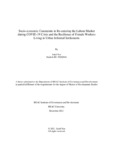| dc.contributor.advisor | Jabeen, Huraera | |
| dc.contributor.author | Nur, Jahid | |
| dc.date.accessioned | 2022-08-08T06:26:28Z | |
| dc.date.available | 2022-08-08T06:26:28Z | |
| dc.date.copyright | 2021 | |
| dc.date.issued | 2021-12 | |
| dc.identifier.other | ID 19262016 | |
| dc.identifier.uri | http://hdl.handle.net/10361/17073 | |
| dc.description | This thesis is submitted in partial fulfillment of the requirements for the degree of Masters of Development Studies, 2021. | en_US |
| dc.description | Cataloged from PDF version of thesis. | |
| dc.description | Includes bibliographical references (pages 60-69). | |
| dc.description.abstract | COVID-19 has disproportionately impacted women globally, especially their livelihoods. In Bangladesh, female workers in the informal sector not only lost their livelihoods at a higher rate compared to their male counterparts but are also facing greater challenges in re-entering the labour market. These challenges are multifaceted for the female workers living in urban informal settlements. The pre-existing socio-economic constraints have been reinforced by the COVID-19 crisis, affecting their ability to cope with the loss of livelihood. This research aims to explore and analyse the socio-economic constraints that the female workers living in urban informal settlements in Dhaka city are experiencing in re-entering the labour market during COVID-19; furthermore, examine the strategies they are adopting to cope with the challenges engendered from their struggle to secure livelihoods. The research used case studies and key informant interviews to explore how the pre-existing socio-economic constraints around gender norms, gender roles, occupational sex-segregation, lack of education and skills, informality and restricted mobility shaped themselves to create challenges for the female workers living in urban informal settlements in re-entering the labour market during the pandemic. Moreover, the research identified that these workers adopted short-term strategies such as reducing consumption, relying on social capital, taking loans, using savings and depending on aids and supports from different entities to cope with the challenges. The findings of this research are expected to inform policies for creating access to livelihood for the female workers who are living in urban informal settlements and are engaged in the informal sector in both during and post-pandemic situations. | en_US |
| dc.description.statementofresponsibility | Jahid Nur | |
| dc.format.extent | 71 pages | |
| dc.language.iso | en | en_US |
| dc.publisher | Brac University | en_US |
| dc.rights | Brac University theses are protected by copyright. They may be viewed from this source for any purpose, but reproduction or distribution in any format is prohibited without written permission. | |
| dc.subject | Labour market | en_US |
| dc.subject | Covid-19 | en_US |
| dc.subject | Female workers | en_US |
| dc.subject | Gender | en_US |
| dc.subject | Livelihood | en_US |
| dc.subject | Urban informal settlements | en_US |
| dc.subject | Socio-economic constraints | en_US |
| dc.subject.lcsh | Women -- Employment. | |
| dc.subject.lcsh | Bangladesh -- Social conditions. | |
| dc.title | Socio-economic constraints in re-entering the labour market during COVID-19 crisis and the resilience of female workers living in urban informal settlements | en_US |
| dc.type | Thesis | en_US |
| dc.contributor.department | BRAC Institute of Governance and Development, Brac University | |
| dc.description.degree | M. Development Studies | |

